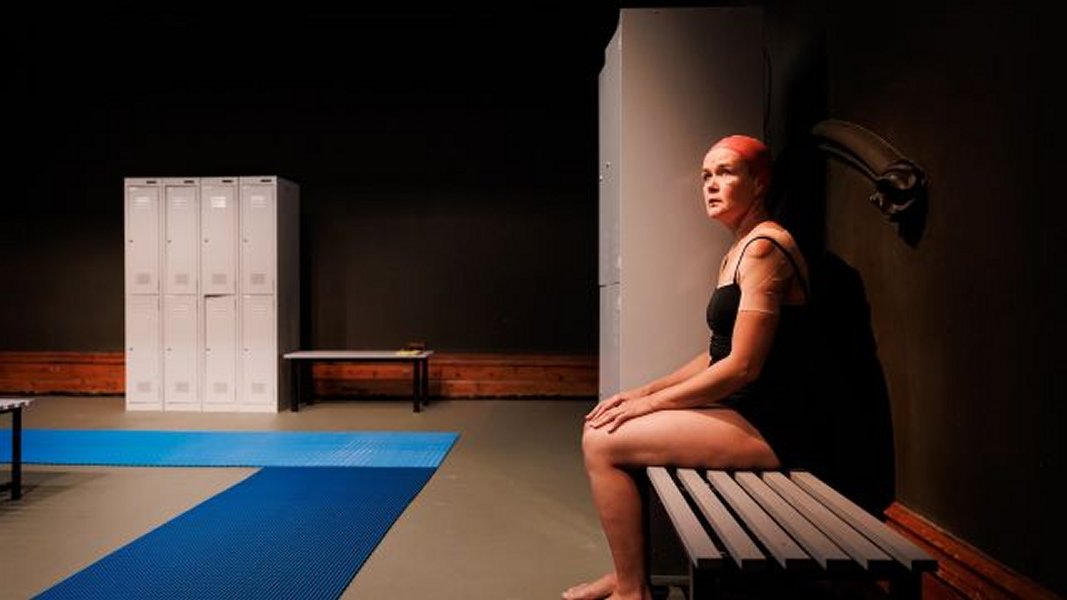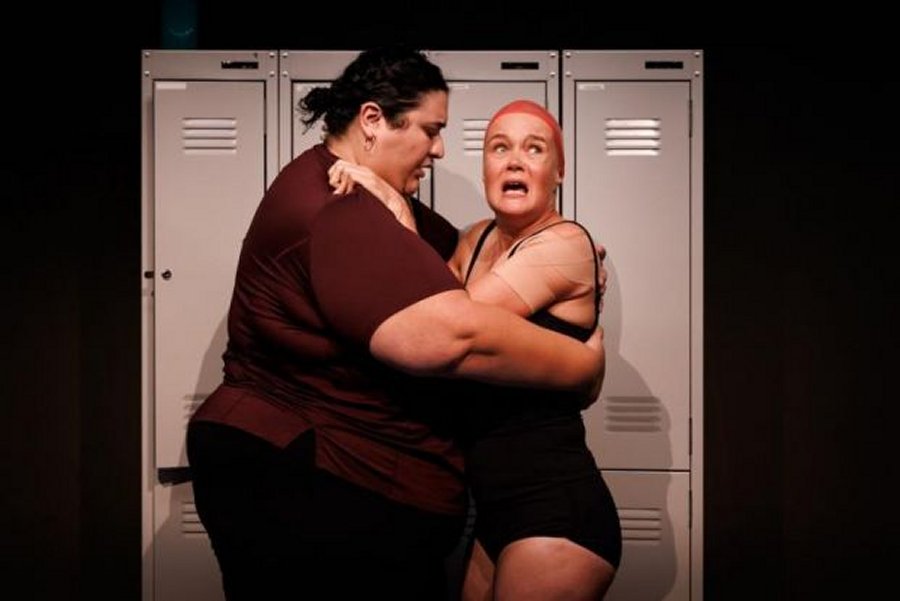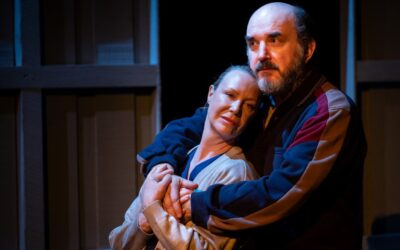By Darby Turnbull
I sat and waited but you were gone too long…is a gorgeous invitation to surrender to sensory aspects of witnessing live performance. Like Letting bleeding girls lie; the third part of Liv Satchell’s grief trilogy that I’ve previously engaged with (I’m finally seeing My sister Feather next week) there’s an evocative use of stillness, stretched out for long durations, that encourages; and depending on your capacity for a certain kind of focus; rewards heighted levels of concentration. It’s a gentle offer to the audience to just immerse yourself in the mundane and let your attention be drawn to the subtlest of details; the dripping of water, the shifts in body and facial expression. The trust in the collective ability to pull this off with such profundity is immense but these are artists more than equal to the challenge.
Emily Tomlins (who’s credited as co-writer) has the kind of presence that can take you on an emotional journey with just her frame and the flickers in her eyes; accentuated by a tight Pierrotesque swimming cap that frames her exquisitely expressive face. As the minutes stretch by as she just sits in a swimming pool changing room. It’s a bold way to ease ourselves into the perverse, transgressive nature of watching someone in a private space. Changing rooms are such fraught environments in terms of what they can expose and facilitate; as a recreational swimmer I just want to get in and out as quickly as possible without making contact; but it’s a compelling theatrical setting for unexpected, mundane connection. James Lew’s set is a deft encapsulation of the basic elements; lockers, benches, fluorescent lighting (what I wouldn’t give to see a site-specific production of this text); that has a deep understanding of the physical and emotional dimensions afforded by open space which skilled performers can use to its potential.
Tomlins is joined eventually by Chanella Macri (also credited as Co-Writer) who goes through her post work out ablutions and we’re oriented into another long stretch of getting to know someone through basic activity. By the time either of these two women speak or engage with each other the tension is so elevated we can go anywhere with them. Tomlin’s Evie is experiencing intense disassociation from her own identity and the world around her, the more grounded Ellen (Macri) is uniquely unfazed about engaging with such a person given that she’s caring for her grandmother who’s’ experiencing dementia, to whom she has almost identical phone conversations with several times throughout the piece.
The text has a sharp understanding of the grief induced evolution of both the body and psyche. Tomlins is chillingly in how adeptly she conveys the vulnerability of having such a tenuous grasp of your own reality. The text never makes clinical generalisations about what Evie is experiencing but it does suggest a form of psychosis; whether grief induced, long term or both. We see and hear Evie’s voices alongside her and the curiosity and distress they evoke in her. I’ve worked alongside and have close relationships with people who have or currently hear voices, and at least from my own experience of existing in that space, Tomlins’ does remarkably encapsulates the effects it has on the body and social mobility. Existing in a public space like that is fraught; there’s the likelihood of mockery, physical danger, pity or intentional dismissal. There’s an understanding that these are feelings that could be provoked in the audience by such a character’s presentation and it’s to the absolute credit of the entire team that we exist with her with compassion and curiosity.

Macri, as ever, invites increasing depths of empathy in a guarded character who nevertheless conveys a full history in her eyes and body every time she moves. Ellen’s a naturally kind and compassionate person and Macri’s skill shows the cost of that; her weariness, the deflection of her own needs, the permission to let her body do things that aren’t rigidly controlled. Movement consultant Xanthe Beesley’s was undoubtedly essential in assisting with meaningful physical characterisations during both the natural and heighted moments in the production.
The dialogue curated by Satchell and her actors with dramaturgy by Emma Valente is intentionally taut with some gorgeous lapses into everyday poetry. It’s dazzling to see work tailored with such skill to such unique artists.
As with Let bleeding girls lie the mundanity does give way to explosive moments of magical realism that allow the abstract depths of grief to explode onto the stage. This is where the production elements, which have thus far been subtly implemented get a full-blown showcase to assault the senses. John Collopy’s inventive lighting, mostly efficient fluoresce, becomes sinisterly playful that imbues the colours on the stage to a sickeningly garish palette. Tom Backhaus and Hannah Mckittrick’s sound compositions provide dexterous connections between wistful everyday sadness and heighted, electric bursts of pain when confronted with the core.
I sat and waited but you were gone too long is a lovely initiative and speaks to the power of creatively facilitated time to sit and engage with deep emotion. I believe this review will go live after the season has concluded but audiences are highly encouraged to see My sister feather (March 8-12) and Let bleeding girls lie (March 15-19) at La Mama Courthouse.
Images: Darren Gill





